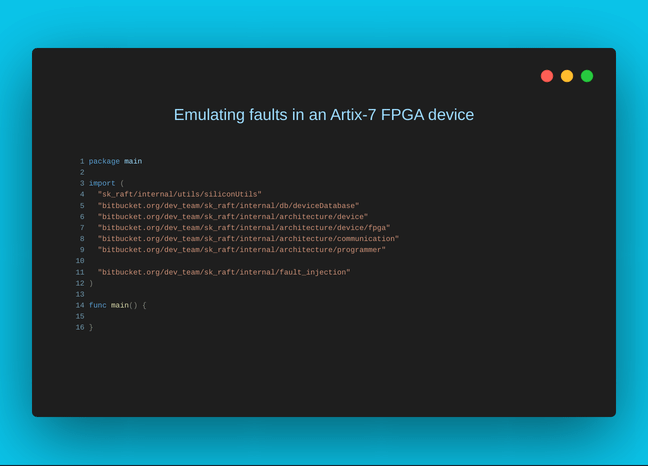We develop cutting-edge fault-tolerant computing solutions to enhance the reliability and resilience of mission-critical systems in Aerospace, Automotive, HPC & AI, and Industrial Safety.
These tools are designed to evaluate, analyse, and test the reliability of computing systems, particularly SoC-FPGAs under radiation and fault conditions.
This category includes solutions that enhance system reliability, ensuring that computing systems can detect, recover from, and prevent faults.
Ensuring high reliability in computing systems is crucial for space, aerospace, automotive, and industrial applications. Radiation effects, hardware faults, and system failures can compromise mission success.
SK-RAFT is our flagship fault injection platform, designed for the functional verification of computing systems used in critical applications. It currently supports FPGA-based platforms, with full compatibility across all AMD-Xilinx devices. We are actively extending its capabilities to support a broader range of computing architectures, including:
Support for Arm-based platforms is planned for upcoming releases, enabling full-stack dependability verification in mixed FPGA-CPU environments in AMD Xilinx SoC FPGAs.
Verification: SK-RAFT enables emulation-based fault injection in alignment with key industry standards such as:
Currently supports fault injection in all Xilinx FPGA families, including 7-Series, Zynq-7000, Zynq UltraScale+, and Versal devices.
Analyses the FPGA’s essential configuration bits and restricts fault injection to these bits, improving test efficiency.
Faults are injected dynamically through JTAG into the FPGA while the circuit runs, enabling noninvasive, real-time evaluation of system response.
Supports Virtual Input/Output (I/O) using the BSCAN primitive inside Xilinx FPGAs, allowing the user to stimulate and observe I/Os without altering the user design.
SK-RAFT is compatible with USB-connected JTAG FTDI programmers and integrates seamlessly with popular FPGA development boards.

SK-FDIR is Solidkosmos’ growing library of software and hardware IP cores designed to increase the fault tolerance of FPGA-based systems in critical applications. It provides various essential software and hardware (VHDL) modules to implement Fault Detection, Isolation, and Recovery (FDIR) strategies in FPGAs. The library is optimised for AMD-Xilinx FPGA-enabled embedded platforms and is validated through real radiation testing.
Developed under an ESA OSIP framework, SK-RECOV introduces advanced fault recovery capabilities for the dual-core Arm A9 CPUs in Zynq FPGAS.
Compared to state-of-the-art, SK-RECOV improves:
Results
SCRUB is a lightweight, hardware-assisted memory scrubbing engine that protects FPGA configuration memory from Multiple Bit Upsets (MBUs) with minimal resource requirements.
SK-MON is a C/C++ software library that runs on embedded or external CPUs to provide real-time health surveillance of SoC-FPGAs.
See how our fault-tolerant computing solutions power high-reliability systems across Aerospace, Automotive, AI, and Industrial applications.